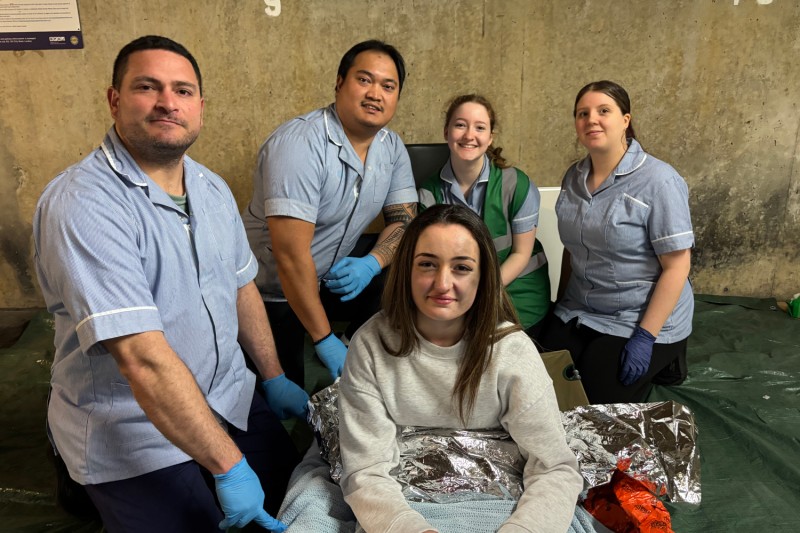Course fees
£1,050.00
For fees and funding info please refer to the FAQs
30 Oct 2025 (Intake closed)
Apply by: 18 Sep 2025
Oct 2025
Face to face
Attendance dates: 30 Oct 2025, 06 Nov 2025, 13 Nov 2025, 20 Nov 2025, 27 Nov 2025
Accredited by




Course overview
During this Master's level unit you'll develop conceptual orientation and knowledge of epidemiological techniques needed for delivering health services to populations. You'll identify what influences the health of population, to assess population health status and need. You'll also develop skills in assessing, planning and evaluating health services and technologies.
Indicative Content
- Terminologies, language of epidemiology and population at risk.
- Methods of epidemiology, study design, sampling techniques, major sources of error and ethical issues in epidemiological research.
- Basic measurements in epidemiology: counts, proportions and rates (crude, adjusted and specific rates).
- Management of data, including the process of inference from sample to study population and from study to target population in epidemiological research.
- The concepts of reliability and validity in epidemiological studies.
- The epidemiological principles in population-based studies (in health and social care settings) including:
- Measures of outcome occurrence (measures of disease frequency); Causation (aetiology): Measures of risk; Formation of causal hypotheses; Evaluation of causal hypotheses.
- The concept of disease clustering, including analysis and assessment of a disease clustering report in the community.
- The epidemiology of specific common chronic and acute ill-health (e.g. cancer, cardiovascular diseases, asthma, occupational diseases, etc.).
- The epidemiology of modern infectious diseases, infectious diseases notification, contact patterns and infectious diseases.
- Public health epidemiology e.g. travel and health, food health and safety, childhood infections and immunisation.
- Environmental epidemiology and molecular epidemiology.
- Early life environment and adulthood disease, including a critical analysis of the foetal original of heart disease.
- Public health measures to control outbreaks of infectious diseases.
Learning and Teaching Strategies
The unit will utilise a wide range of teaching and learning methods including lectures, seminars and practical sessions and student-led presentations. The participants will also undertake critical analysis of epidemiological reports and research via workshops and guided individual study.
This unit is one of the core units for the MSc Public Health.
This course requires 100% attendance.
Learning outcomes
Having completed this unit the student is expected to:
- Demonstrate in-depth knowledge and understanding of epidemiology and a mastery of a complex and specialised area of knowledge and skills.
- Critically evaluate the aetiological relationships and the risk factors associated with a specific disease or group of diseases as well as handling the complexity of the cause-effect relationship within the bounds of professional practice.
- Systematically analyse epidemiological data with aetiological hypotheses developed either clinically or experimentally.
- Critically examine and evaluate preventive procedures as well as social and public health policies, and anticipation of the effect of policy changes upon the delivery of health and social care services.
- Critically review and analyse the role of social and public health agencies in maintaining health and social well-being of the population.
Assessment
This unit will be assessed by a one coursework assignment of 3000 word equivalent (100%).
Course details
Course leader
Jaqui Hewitt-Taylor (JHTaylor@bournemouth.ac.uk)
Course delivery
Face to Face
Downloads
Prerequisites
Normally students may enter Level 7 study if they have been awarded:
- Undergraduate degree (honours or non-honours)
- An equivalent qualification (the learning outcome of which are demonstrably appropriate in terms of knowledge, understanding and skills) equivalent to 120 credits at Level 6.
Why choose BU?
Bournemouth Gateway Building is the home of the Faculty of Health and Social Sciences. Its 10,000 square metres of space has created a unified base for the faculty’s education, research and office activities, which previously took place across several buildings in the Lansdowne area. It is open and accessible to all BU students, staff and the community.
We have a long and close association with health and social care practice partners across the region and enjoy close relationships with Dorset Healthcare University Foundation Trust, University Hospitals Dorset and District Hospitals (Yeovil and Salisbury) and Dorset County Hospital.
We are an established, vibrant and supportive academic community of staff, clinical practitioners, students and service users. Our team of highly qualified nursing staff and social scientists are committed to developing the next generation of outstanding, skilled and compassionate practitioners, having been engaged in developing the nursing workforce for over 25 years.


Make an enquiry
Make an enquiry
